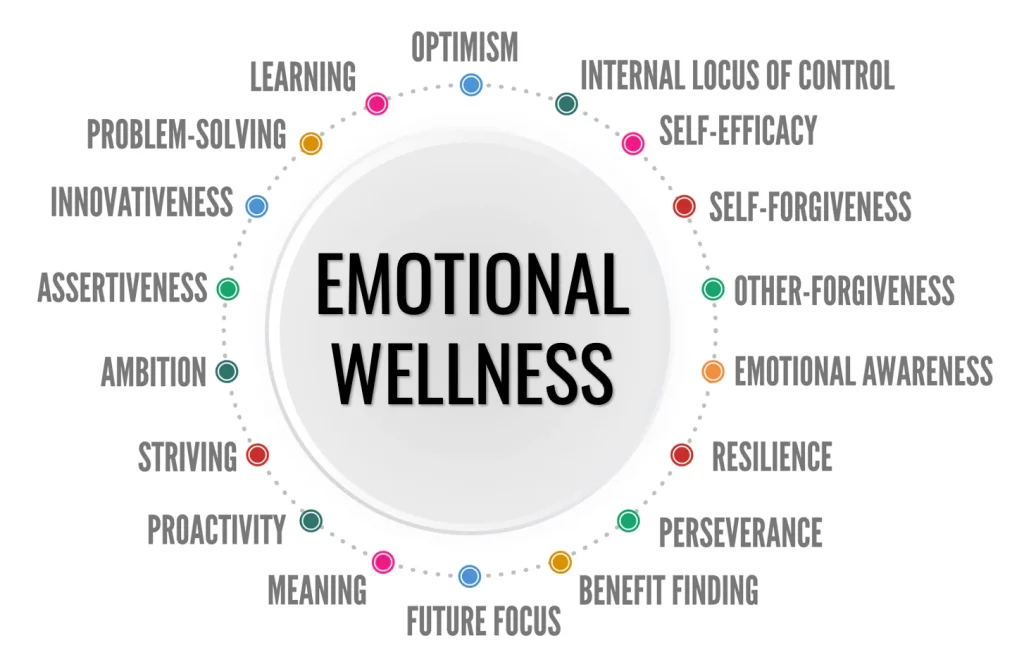Introduction
Emotional wellness, often overlooked in the pursuit of physical health, is an essential aspect of a fulfilling life. It encompasses your ability to manage stress, cope with challenges, and build positive relationships. In this comprehensive guide, we’ll delve into the depths of emotional-wellness, exploring key strategies and insights to help you achieve a state of balance, resilience, and contentment.
Emotional Wellness: Nurturing Your Inner Harmony
Emotional-wellness, often referred to as emotional well-being, encapsulates your ability to understand, manage, and express your emotions in a healthy and productive manner. It influences how you perceive yourself and interact with the world around you. By fostering emotional wellness, you pave the way for a more fulfilling and joyful life.
The Importance of Emotional Wellness
Emotional-wellness is the cornerstone of a thriving life. It impacts your mental health, relationships, and overall quality of life. When your emotional well-being is nurtured, you’re better equipped to handle life’s challenges and embrace moments of joy.
Embracing Self-Compassion
Self-compassion is a fundamental aspect of emotional-wellness. It involves treating yourself with the same kindness and understanding that you extend to others. By practicing self-compassion, you create a nurturing environment for personal growth and emotional healing.
Building Resilience: Weathering Life’s Storms
Resilience is your ability to bounce back from adversity. Cultivating resilience enhances your emotional wellness by empowering you to navigate setbacks and hardships with grace and strength.
Mindfulness and Emotional Wellness
Mindfulness, the practice of being present in the moment, has profound effects on emotional well-being. By cultivating mindfulness, you can better manage stress, reduce anxiety, and improve your overall emotional state.
Nurturing Positive Relationships
Healthy relationships play a pivotal role in emotional-wellness. They provide support, companionship, and a sense of belonging. Learn how to foster and maintain positive relationships to enhance your emotional well-being.
The Power of Gratitude
Gratitude is a potent tool for boosting emotional-wellness. By acknowledging and appreciating the positives in your life, you shift your focus from what’s lacking to what’s abundant.
Pursuing Passions and Hobbies
Engaging in activities you’re passionate about contributes to emotional-wellness. Hobbies offer a creative outlet, reduce stress, and bring a sense of fulfillment to your life.
Balancing Work and Life
Striking a balance between work and personal life is essential for emotional well-being. Learn strategies to manage your responsibilities while making time for self-care and relaxation.
Physical Activity and Emotional Wellness
Regular physical activity isn’t just beneficial for your body; it also has a profound impact on your emotional state. Discover how exercise can boost your mood, reduce stress, and enhance emotional wellness.
Nutrition and Its Connection to Emotions
Your diet plays a significant role in emotional wellness. Certain foods can impact your mood and cognitive function. Explore the link between nutrition and emotional well-being.
Managing Stress Effectively
Stress is an inevitable part of life, but managing it is crucial for emotional wellness. Learn practical techniques to reduce stress and promote a sense of calm.
FAQs about Emotional Wellness

Can emotional wellness affect my physical health?
Yes, emotional-wellness is closely intertwined with physical health. Chronic stress and negative emotions can contribute to various health issues, such as cardiovascular problems and weakened immune function.
How can I enhance my self-awareness for better emotional wellness?
Practicing mindfulness and self-reflection can help you become more in tune with your emotions and thought patterns, fostering greater self-awareness.
Is it normal to experience fluctuating emotions?
Yes, it’s entirely normal to have ups and downs in your emotional state. Emotions are fluid and can be influenced by various factors, including life events and hormonal changes.
Can social media impact my emotional well-being?
Yes, excessive use of social media can negatively impact emotional-wellness. It may lead to feelings of inadequacy, anxiety, and social comparison. Limiting screen time and practicing digital detox can help.
How does practicing gratitude contribute to emotional wellness?
Practicing gratitude shifts your focus from negativity to positivity. It rewires your brain to seek out the good in life, leading to improved emotional well-being and overall happiness.
What role does professional therapy play in emotional wellness?
Therapy can be immensely beneficial for emotional wellness. It provides a safe space to explore and address underlying emotional issues, develop coping strategies, and enhance overall well-being.
Embracing Change for Lasting Emotional Wellness

Change is an inevitable part of life, and embracing it is vital for maintaining emotional wellness. When you learn to adapt and view change as an opportunity for growth, you enhance your resilience and reduce the impact of stress.
The Role of Sleep in Emotional Well-Being
Quality sleep is a cornerstone of emotional wellness. Adequate sleep supports cognitive function, mood regulation, and stress management. Discover the importance of a good night’s rest in nurturing your emotional well-being.
Expressing Emotions: Finding Your Voice
Effective communication of emotions is crucial for emotional wellness. Learning how to express your feelings constructively can enhance your relationships and provide a sense of emotional release.
The Connection Between Nature and Emotional Wellness
Spending time in nature has a profound impact on emotional well-being. Nature offers tranquility, reduces stress, and promotes a sense of connectedness. Learn how to incorporate nature into your daily routine.
Practicing Acts of Kindness: Boosting Your Mood
Engaging in acts of kindness, whether small or grand, has a positive effect on emotional wellness. Acts of kindness release endorphins and create a sense of fulfillment and joy.
Harnessing the Power of Laughter
Laughter truly is the best medicine. It releases tension, boosts mood, and promotes relaxation. Discover how laughter therapy and humor can contribute to your emotional well-being.
Coping with Grief and Loss
Grief is a natural response to loss, and navigating it is essential for emotional wellness. Learn healthy ways to cope with grief and support others who may be experiencing loss.
Setting Boundaries for Emotional Wellness
Establishing healthy boundaries is vital for protecting your emotional well-being. Boundaries help prevent burnout, maintain healthy relationships, and promote self-care.
Creative Expression for Emotional Release
Engaging in creative activities, such as art, music, or writing, provides an outlet for emotional expression. Creative expression can help you process emotions and channel them in a positive direction.
The Impact of Social Support on Emotional Wellness
Building a strong social support network is crucial for emotional wellness. Meaningful relationships provide a sense of belonging, reduce feelings of isolation, and offer emotional validation.
Overcoming Negative Self-Talk
Negative self-talk can undermine emotional wellness. Challenge and reframe self-limiting beliefs to cultivate a positive and compassionate inner dialogue.
Strategies for Dealing with Anxiety
Anxiety can significantly impact emotional well-being. Learn practical strategies, such as deep breathing exercises and mindfulness techniques, to manage and reduce anxiety.
Embracing Vulnerability: A Path to Authenticity
Embracing vulnerability allows for authentic connections and emotional growth. It involves being open and honest about your feelings and experiences, leading to deeper relationships.
Balancing Digital Engagement for Emotional Wellness
Digital technology can both enhance and hinder emotional wellness. Establishing a healthy relationship with technology, such as setting screen time limits, contributes to a balanced life.
Exploring Mind-Body Practices
Mind-body practices, such as yoga and meditation, promote emotional wellness by integrating physical and mental well-being. These practices enhance relaxation, self-awareness, and emotional resilience.
FAQs about Emotional Wellness (Continued)
How can I differentiate between normal emotional fluctuations and a more serious emotional issue?
Differentiating between normal emotional shifts and a more serious concern involves assessing the duration, intensity, and impact on daily life. If emotions significantly interfere with your well-being, seeking professional help is advisable.
Can lifestyle changes positively impact emotional wellness?
Yes, adopting a healthy lifestyle that includes regular exercise, balanced nutrition, and sufficient sleep can have a positive impact on emotional well-being.
What are some effective stress management techniques?
Stress management techniques include deep breathing exercises, progressive muscle relaxation, mindfulness meditation, and engaging in enjoyable activities.
Is seeking therapy a sign of weakness?
No, seeking therapy is a sign of strength and self-awareness. It demonstrates a willingness to prioritize your mental and emotional well-being and seek support when needed.
How does journaling contribute to emotional wellness?
Journaling provides an outlet for processing emotions, gaining insights into your thoughts, and promoting self-reflection. It can help you identify patterns, set goals, and track your emotional journey.
Can volunteering improve emotional wellness?
Yes, volunteering and helping others can boost your emotional well-being by fostering a sense of purpose, increasing self-esteem, and creating a positive impact on your community.
Conclusion
In the pursuit of a fulfilling life, emotional wellness stands as a pillar of strength and resilience. By implementing the strategies outlined in this guide, you empower yourself to navigate life’s challenges with grace, cultivate positive relationships, and experience the joy of authentic emotional expression. Remember, the journey to emotional wellness is ongoing, and every step you take contributes to your overall well-being.
 The Care Up
The Care Up




